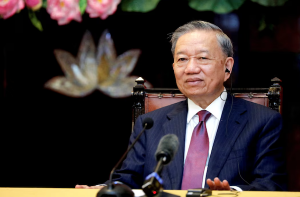An Indonesian minister on Thursday appeared to backtrack on a pledge to end deforestation by 2030, just days after the country agreed to the deadline at the COP26 climate meeting in Glasgow.
Environment Minister Siti Nurbaya Bakar branded the pledge as “inappropriate and unfair” to a developing country. The Southeast Asian archipelago is home to a third of the world’s rainforests.
Stopping development in the name of zero deforestation was unconstitutional, she said, as the government had pledged to give its people economic development and improve their welfare.
Siti said definitions of deforestation differ widely, and criticised the international community for imposing European standards onto Indonesia.
“The natural wealth of Indonesia including forests must be managed for its utilisation according to sustainable laws, besides [being] equitable,” she wrote on Facebook.
“We also reject the use of deforestation terminology that is not in accordance with existing conditions in Indonesia.”
Siti said Indonesia is committed to reducing greenhouse gas (GHG) emissions by 29% by 2030 through its own capabilities. But she noted that international support would enable the southeast Asian archipelago to reduce GHG emissions by 41% in that time.
Last week, Suahasil Nazar, deputy finance minister, said Indonesia would need funding of about $250 billion to reduce the use of coal-fired power plants enough to meet carbon emission reduction targets.
Rida Mulyana, director general of electricity generation at the energy ministry said the government was still formulating an early retirement programme for the country’s existing coal-fired power plants.
The capacity of fossil fuel power plants is forecast to increase by 19.6 gigawatts, or 48.4% over the next decade. The capacity of renewable energy-based power plants is projected to rise by 20.9 gigawatts, or 51.6%.
• George Russell
READ MORE:
EU Warns Indonesia over Trade Pact: Jakarta Post
Telkom Tower Subsidiary Set for Indonesia IPO Record: Nikkei
























